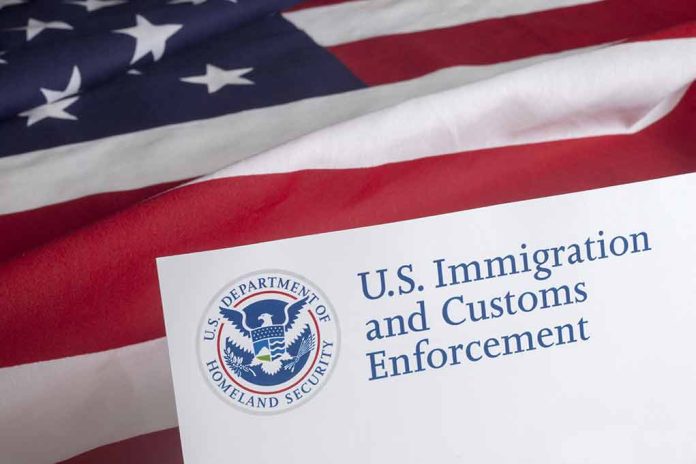
Here’s the article formatted in HTML as requested:
ICE’s aggressive pursuit of violent fugitives sparks controversy and raises questions about the balance between public safety and civil liberties.
At a Glance
- ICE has detained and deported record numbers of individuals in recent years
- Critics argue that ICE’s tactics often deny individuals the right to a fair court hearing
- The USA has the largest immigration detention system globally, with over 20,000 individuals detained daily by ICE
- ICE’s practices have been criticized for tearing American families apart and undermining community trust in law enforcement
- The 287(g) program, which allows local law enforcement to partner with ICE, has been accused of fostering racial profiling and civil rights abuses
ICE’s Enforcement Efforts: A Balancing Act
Immigration and Customs Enforcement (ICE) continues to intensify its efforts to apprehend violent fugitives who have entered or overstayed their welcome in the United States. Operating from border regions to cities like Baltimore, ICE agents face complex challenges in their pursuit of individuals deemed threats to public safety. However, these operations have sparked heated debates about the agency’s tactics and their impact on communities across the nation.
ICE’s enforcement programs have come under scrutiny for potentially infringing on constitutional rights. The American Civil Liberties Union (ACLU) has raised concerns about the agency’s practices, highlighting issues related to Fourth Amendment protections against unreasonable searches and seizures.
#DYK @ICEgovERO Fugitive Operations directs intelligence-driven pursuit of at-large noncitizens already in the U.S. who pose the greatest threats to your safety & national security, like sex offenders, violent criminals & #opioid traffickers. Get facts at https://t.co/uAFoNbjXcG https://t.co/agM6UrubMs
— ICE (@ICEgov) May 31, 2024
Detention Conditions and Human Rights Concerns
The scale of ICE’s operations is significant, with the United States operating the world’s largest immigration detention system. Over 20,000 individuals are detained daily by ICE, raising questions about the conditions in these facilities and the treatment of detainees.
“The ACLU works in courts, legislatures, and communities to defend and preserve the individual rights and liberties that the Constitution and the laws of the United States guarantee everyone in this country.”
Reports have emerged of poor conditions in detention centers, including overcrowding, lack of sanitation, and limited access to medical care. These issues have been exacerbated by the COVID-19 pandemic, with concerns about inadequate measures to prevent the spread of the virus in confined spaces.
The 287(g) Program: Collaboration or Overreach?
One of the most controversial aspects of ICE’s operations is the 287(g) program, which allows local law enforcement agencies to partner with ICE in immigration enforcement. As of April 2022, 142 state and local agencies were participating in this program. However, critics argue that it has led to widespread racial profiling and civil rights violations.
“These enforcement programs pose a variety of threats to civil liberties: They implicate the Fourth Amendment’s protection against unreasonable searches and seizures, the constitutional guarantee of due process, and the constitutional guarantee of equal protection and freedom from discrimination based on race, ethnicity, and national origin.” ~ACLU
The ACLU report on the 287(g) program found that nearly two-thirds of participating agencies have records of racial profiling and other civil rights abuses. This has raised concerns about the program’s impact on community trust in law enforcement and its overall effectiveness in promoting public safety.
The IMAGE Program: Public-Private Partnerships in Immigration Enforcement
Another initiative under scrutiny is the ICE Mutual Agreement between Government and Employers (IMAGE) program. This public-private partnership provides training to employers on identifying immigration status and using electronic work authorization programs. In exchange, ICE waives potential fines for employers who inadvertently hire unauthorized immigrants.
However, studies have suggested that increased arrests in communities with IMAGE agreements are not correlated with crime rates, raising questions about the program’s effectiveness in enhancing public safety. Critics argue that such programs may lead to discrimination and fear within immigrant communities without providing tangible benefits to overall safety.
The Path Forward: Balancing Security and Civil Liberties
As the debate over ICE’s tactics and effectiveness continues, policymakers face the challenge of balancing national security concerns with the protection of civil liberties. The ACLU and other advocacy groups call for greater transparency and accountability in immigration enforcement practices.
“The ACLU is working to ensure that U.S. immigration enforcement is transparent and accountable to the American public.” ~ACLU
As ICE continues its efforts to apprehend violent fugitives, the agency must navigate complex legal and ethical terrain. The ongoing discussion surrounding immigration enforcement highlights the need for a comprehensive approach that addresses public safety concerns while upholding constitutional protections and human rights for all individuals within U.S. borders.








